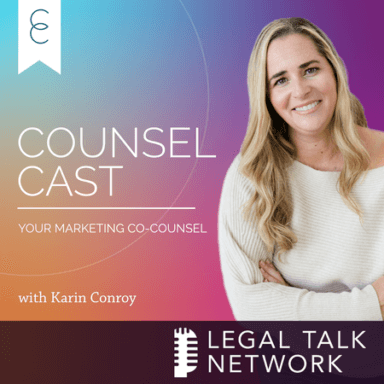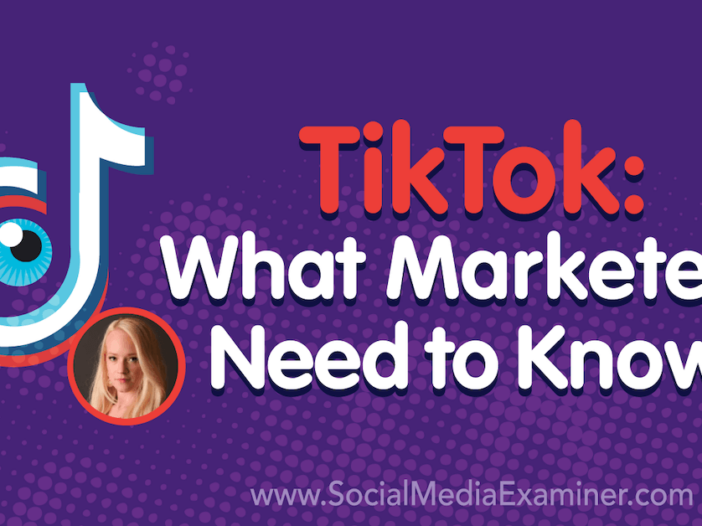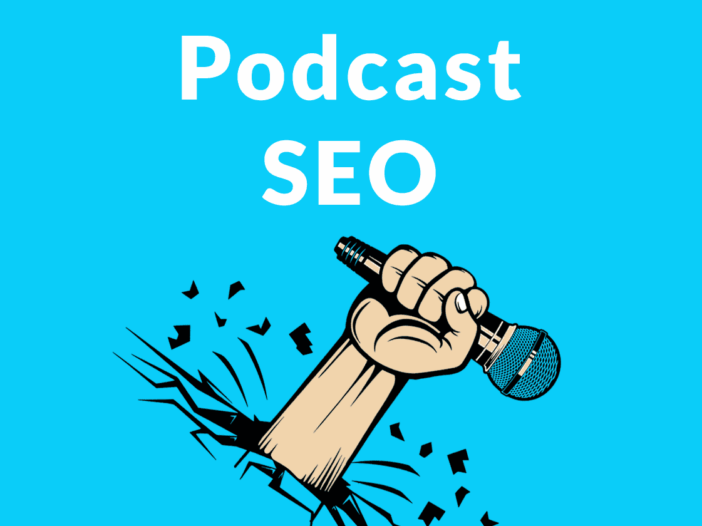Your user agent does not support the HTML5 Audio element.
Karin Conroy is a legal marketing consultant and founder of Conroy Creative Counsel, which specializes in creating…
In this episode, Nicki Sciberras from Digital Exchange shares insights on how law firms can leverage Meta ads to grow their businesses. The discussion covers the importance of understanding marketing funnels, the types of Meta ads and how they work, common mistakes in ad campaigns, and the significance of website optimization.
Nicki emphasizes the need for proper testing and targeting in ad campaigns, highlights the impact of a positive money mindset on marketing budgets, and provides practical advice for improving conversion rates. The episode also underscores the role of agencies in achieving optimal results from Meta ads.
Nicki is a Meta Ads and SEO strategist and coach. An expert in her field, she helps online businesses profitably grow and scale their brand so they can live life on their own terms.
Monica gives listeners actionable tips on:
Resources mentioned in this episode:
Connect with Nicki here:
Connect with me
Special thanks to our sponsor Conroy Creative Counsel.
Notify me when there’s a new episode!
The podcast that provides the expertise of a Marketing Co-Counsel for your law firm. Where your firm gets answers and clarity to your marketing questions.

Sign up to receive featured episodes and staff favorites once a month.
Newsletter Signup
10 Reasons Why You Need to Add Podcasts to Your Content Strategy – Search Engine Journal
Join us in analyzing 3 case studies that show the importance of driving brand search behavior and engagement, and how to do it in months, instead of years.
Maximize your SEO efforts in 2024 with insights on Google’s SGE, algorithm updates, and expert tips to keep your site ahead.
Download this guide and learn how to optimize and manage Google Performance Max campaigns, with expert insights and actionable strategies to ensure your campaigns are effective.
Join us in analyzing 3 case studies that show the importance of driving brand search behavior and engagement, and how to do it in months, instead of years.
Join us in analyzing 3 case studies that show the importance of driving brand search behavior and engagement, and how to do it in months, instead of years.
Join us as we dive into exclusive survey data from industry-leading SEOs, digital marketers, content marketers, and more to highlight the top priorities and challenges that will shape the future of search in 2025.
Podcasts offer many benefits for businesses. Here are 10 reasons why podcasts are the perfect addition to any existing content strategy.
Some time ago, I stopped listening to the same, tired Spotify playlist every morning and began listening to podcasts.
Packed with information and the perfect sprinkle of entertainment and light-hearted banter, podcasts are incredibly engaging and a useful medium for businesses and listeners alike. They are the sleeping giant of content types, though.
Most businesses don’t understand the true potential behind podcasts. And there’s a huge number of reasons why they are the perfect addition to any existing content strategy.
Let’s explore ten of the top reasons to add podcasting to your content assets.
The content marketplace is competitive, like really competitive.
Successful digital marketers find big wins with their content when they find a content type or topic with high engagement and low competition. That’s exactly what a podcast provides.
While there are around 80 million Facebook business pages, there’s only 700,000 podcasts airing. This number shrinks when you search by topics.
There may be only a handful of other podcasts discussing the topics relevant to your business, with hundreds-to-thousands of listeners.
With this low competition, it’s far easier to have your podcast stand out and gain listeners!
Podcasts require little effort to engage with, on the listener’s behalf.
Unlike written blog content, which has to be read, or even videos that require audiences to sit and watch. All a podcast listener has to do is hit play and listen.
It’s the perfect content type for multi-tasking, which most of us are doing on a constant basis anyways.
If content is too demanding of time or attention, it’s hard for audiences to want to engage.
Finding time to listen to a podcast is easier, because it only asks for the attention of the customer’s ears. We can listen while we work or play.
Part of the low-effort, multi-tasking richness of podcasts is due to how mobile-friendly this medium is.
As I mentioned, I enjoy listening to my favorite podcasts during my commute, through my smartphone. And, I’m not alone; 69% of podcast listeners are on their mobile devices.
As we increasingly choose mobile devices over other technologies, adopting mobile-friendly content types is important.
It’s easy for podcast listeners to consume this content while they are on the move, whether at the gym, in the car, relaxing at home, or elsewhere.
The number of podcast listeners is growing.
There were 48 million weekly podcast listeners in 2018, according to Statista data. This audience is expected to grow to 115 million by 2021.
This is a big turning point for podcasts and an important time period for marketers looking to begin creating a podcast.
Now is the time to get started, since more businesses are going to begin creating this content and developing their audiences.
Getting into the podcast game now will allow you to beat the crowd and begin developing an audience before the heavier competition sets in.
Developing a podcast audience ahead of the competition is incredibly important because listeners are loyal to their favorite programs.
They establish relationships with the host(s) and want to check back each time there is a new podcast episode.
If you can establish a strong audience before the podcast boom, it will be hard for your competitors to attract those listeners to their own shows.
This loyalty also translates to other marketing channels. For example, podcast listeners are 20% more likely to connect with a brand on social media.
When the podcast is over, audiences will turn to channels like social media to continue the conversations and interact with each other and your business.
One of the reasons that podcasts are so engaging and foster such loyal audiences is because they are very interactive.
Hosts can create audience polls, answer questions, and take “calls,” just like a traditional radio show. This helps pull listeners into the show and makes consuming the content feel more like an interactive experience, rather than simply listening to audio.
This interactivity helps solidify that connection with audiences. Very few content types offer this level of brand-customer interaction.
You can also interview other experts in your industry, which helps build your professional network and establishes credibility in your field.
In terms of creation costs, podcasts are scalable. Like photo and video content, the cost to create is really dependent on quality.
Smartphones shoot exceptional videos and photos, but if you want to raise that content to the next level, then you need to invest in more expensive equipment.
The same is true for podcasts. You can capture good audio with relatively cheap equipment bought on Amazon. However, the quality may not be up to par with what audiences are used to from long-established podcasts.
As you develop your audience, you may decide to increase your podcast budget to include more expensive equipment. Luckily, this is totally controllable; you can scale costs to meet the demands of your audience.
Aside from offering customers value, one of the primary reasons that we develop content is to establish credibility and a reputation as a thought leader in the market.
This is why informative articles, case studies, guides and all manner of other well-research content assets are so valuable.
They help showcase to audiences that you provide helpful information and solutions to their questions and problems.
Podcasts are very impactful at growing this reputation as a credible, expert source because audiences get to hear it right from your own mouth.
If you’re passionate and invested in what you do, as most business owners and marketers are, then it should be no problem conveying these emotions across in a podcast.
Audiences will hear it in your voice!
The average listener earns around $10,000 more than the average U.S. consumer, according to a 2016 report on podcast consumers. And, 15% of listeners earn over $150,000.
This leads me to believe podcast fans may be more likely to have disposable income, which they are willing to spend with their favorite brands and businesses. This makes them a high-value market segment.
These individuals are also more likely to be college-educated than the typical consumer, as well. Thus, they are more open to absorbing new information, learning about complex ideas and purchasing decisions.
All of your blog posts and other content pieces should be scheduled, but audiences may not ever take notice, like they will with a podcast.
If your podcast airs on the same day each week (or same time each day), listeners will get used to the schedule. They’ll expect and anticipate the release of each podcast episode.
Not only does this help build buzz surrounding your show, but it also guarantees that your business’ name stays on the minds of audiences all week long. This does wonders for brand awareness,
Podcasts bring a lot of benefits to a business’ posting strategy.
Some of these benefits, however, are dwindling, as these online, radio-like shows become more popular. The competition for podcast audiences is heating up.
If you’ve ever thought about beginning to record a weekly, or even monthly, podcast for your customer to listen to, now is the time to start!
You’ll be able to establish that loyal audience, before your competitors enter the podcasting space.
More Resources:
Meet Ashley, a global marketing manager, serial entrepreneur, and thought leader with 13+ years of marketing experience. She’s a sought-after …
Conquer your day with daily search marketing news.
Join Our Newsletter.
Get your daily dose of search know-how.
In a world ruled by algorithms, SEJ brings timely, relevant information for SEOs, marketers, and entrepreneurs to optimize and grow their businesses — and careers.
Copyright © 2024 Search Engine Journal. All rights reserved. Published by Alpha Brand Media.
Increase Your Listeners with Enhanced Apple Podcasts Audio Transcript Search in iOS 13 – Rev
Forget meeting fatigue, missed details, and tedious tasks. VoiceHub will change the way you work. Coming soon.
Forget meeting fatigue, missed details, and tedious tasks. VoiceHub will change the way you work. Coming soon.
Forget meeting fatigue, missed details, and tedious tasks. VoiceHub will change the way you work. Coming soon.
Forget meeting fatigue, missed details, and tedious tasks. VoiceHub will change the way you work. Coming soon.
Team of one. Global operation. Everything in between. We’ve got it all covered. Rev handles the tedious job of transcripts, captions, and subtitles so you’ll get work done faster. If you haven’t found what you need yet, we still bet we can help.
Team of one. Global operation. Everything in between. We’ve got it all covered. Rev handles the tedious job of transcripts, captions, and subtitles so you’ll get work done faster. If you haven’t found what you need yet, we still bet we can help.
Apple announced that select podcasts will not have searchable audio transcripts. Here's what you can do to imprive your podcast SEO to grow your audience.
Luckily for you, we deliver. Subscribe to our blog today.
A confirmation email is on it’s way to your inbox.
Recently, Apple announced that in iOS 13 they’ll be providing searchable audio transcripts for eligible Apple podcasts. If your show is transcribed, that means that when listeners search for certain terms the app looks for those terms in your podcast transcripts as well as in your titles and topics.
It was also announced at the WWDC 2019 that Apple Podcasts is also coming for Mac, separate from its previous home in iTunes. This means even more opportunity to reach new audiences.
Podcasts are soaring in popularity, largely because they’re the ultimate multi-tasking tool. People can listen while working out at the gym, walking the dog, mowing the lawn, doing housework, driving to work, etc. None of those things can be safely done while reading a blog post!
Just how popular are podcasts?
But such popularity also has a downside. Podcasters have to put in a lot of effort just to get noticed. That’s especially important to podcasters wanting to drive traffic to their website, sell a product or service, or attract paid sponsors.
With nobody knowing exactly what the secret formula is at any given time, that left podcasters everywhere jumping through hoops to be discovered.
We don’t know Apple’s search algorithm with the new automatically transcribed podcasts. Whether they only transcribe popular shows or a selected few, we do know the archive isn’t extensive.
To search podcast transcripts in the Apple Podcasts app, you simply search for the key term in the search bar.
Go to the Podcasts app, type your key term into the search bar, and search!
You won’t see the transcript itself (a snippet, at best) unless you copy and pasted a transcript into the show notes.
The search term will likely only yield a result for the spoken content in your episode if you’ve put your own transcript in the show notes, especially with this feature being so new and unclear on its exclusivity.
For podcasters wanting to show up in iTunes searches, the secret to success has been something like the hunt for Bigfoot, with everybody vouching for their own “trick”:
Other than those four things and a few other tips that sound like they should be part of some conspiracy show, podcasters have had to sit by and hope listeners would stumble across their podcasts while browsing categories. With the iOS 13 update, however, users can find them by search terms that appear in the transcripts of the podcast, not just the titles and subtitles.
There’s definitely a few potential pros and cons.
So, for many podcasters, this new update may not provide much benefit. Unlike getting your own podcast transcript, you can’t download it or do anything with it.
In fact, this update could even put you at a disadvantage, since the bigger fish have a better chance of showing up in search results.
However, if you’re already currently following best practices for podcast SEO, then you have nothing to worry about.
At the very least, make sure you’ve optimized your podcast SEO by including things like titles, speaker names, topics, etc.
The best optimization, however, is to include a full transcript of your episode in your show notes. This transcription is owned by you, not Apple — that you can include in your podcast description and post on your own website.
We can transcribe your podcast for $1/minute, leveling the playing field for those not included in Apple’s transcription service. And, unlike Apple, we guarantee a 99% accuracy rate. Plus, you own the audio transcript. You can use it for pull quotes, tweets, Instagram captions, and anything else you need to tell your story.
On a budget? Our automated transcription service only costs $.10/minute at 80% accuracy.
Apple may have good intentions, but if their transcription search rolls out the way they’ve described it, it gives the biggest boost to those who need it the least. Podcasters who are still growing their following need to level the playing field by making sure their podcasts are just as searchable as those chosen by Apple.
Having a copy of your podcast transcript means that you can use it to create as much additional content as you want. Grab a quote to Tweet or to use as a caption for an Instagram post, or use part of the podcast as the starting point for a blog post. When you own it, the sky’s the limit.
Lorem ipsum dolor sit amet, consectetur adipiscing elit, sed do eiusmod tempor incididunt ut labore et dolore magna aliqua. Ut enim ad minim veniam, quis nostrud exercitation ullamco laboris nisi ut aliquip ex ea commodo consequat. Duis aute irure dolor in reprehenderit in voluptate velit esse cillum dolore eu fugiat nulla pariatur.
Ordered list
Unordered list
Text link
Bold text
Emphasis
Superscript
Subscript
Lectus donec nisi placerat suscipit tellus pellentesque turpis amet.
Sign up to get Rev content delivered straight to your inbox.
BenWil Marketing Agency Launches Cutting-Edge SEO Services in Bangladesh – EIN News
TikTok: What Marketers Need to Know – Social Media Examiner
Social Media Examiner
Your Guide to the Marketing Jungleby /
Are you curious about TikTok? Wondering how to use TikTok for your marketing?
To explore what marketers need to know about TikTok, I interview Rachel Pedersen on the Social Media Marketing Podcast.
Rachel is an organic social marketing pro and host of the Social Media Secrets podcast. Her new book is called, I Need Attention.
Rachel shares how TikTok works, how marketers can develop content for TikTok, and more.
This article is sourced from the Social Media Marketing Podcast, a top marketing podcast. Listen or subscribe below.
Where to subscribe: Apple Podcasts | Spotify | YouTube Music | YouTube | Amazon Music | RSS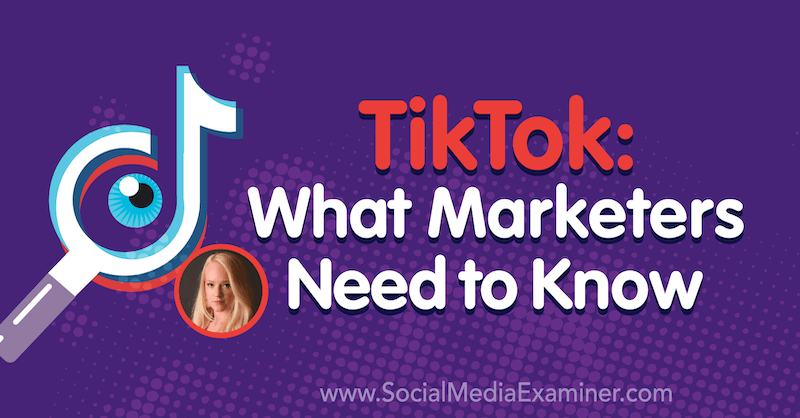
Rachel’s experience with social media marketing began when she was a hairstylist. As she was doing highlights on a client 3 years ago, the client asked for Rachel’s help in understanding Twitter on behalf of her husband’s chicken company. At that moment, Rachel realized that she may not be a social media expert, but she was certainly an expert in the client’s eyes.
She knew enough to help the client and her husband figure out Twitter, Facebook, and the world of marketing that had always intrigued her.
Rachel began talking to her client further about the chicken company’s social media game plan. Within a few months, she was invited to continue consulting for the entire franchise, and the company became her first official social media marketing client. According to Rachel, everything just continued to grow from there.
Rachel now focuses on creating organic social media strategies that drive consistent revenue for renowned clients that do 7, 9, and even 10 figures a year in revenue. She’s helped Fortune 500 companies and famous people go viral on social media. So when she started hearing the buzz about TikTok, she immediately recognized it’s a new avenue that marketers haven’t yet explored.
Rachel began using TikTok in winter 2018. As soon as she joined this new platform, she wanted to understand it as quickly as humanly possible. Although she feels like she came late to the platform, she’s still ahead of the marketing industry and an early adopter among her peers.
TikTok was previously a popular app called Musical.ly, where users mainly posted lip-syncing videos. The first time Rachel scrolled through TikTok, she saw video after video of this type of content. She and her children joined the fun by sharing their own rendition of the song “Baby Shark” on TikTok.
Get expert training and an unbeatable conference experience when you attend Social Media Marketing World—from your friends at Social Media Examiner.
Broaden your reach, skyrocket your engagement, and grow your sales. Become the marketing hero your company or clients need!
🔥 As a valued reader, you can save $820 on an All-Access ticket if you act now. Sale Ends Tuesday! 🔥
Rachel confesses that it felt awkward putting up her first video on TikTok, but she posted it anyway. In spite of having only six followers, her first video was viewed by 9,400 people by the next day. She immediately saw a big opportunity in TikTok that neither Facebook nor Instagram can deliver.
Hungry to dive into and experiment with TikTok, Rachel created videos almost every day. With very little effort and zero spend, her TikTok following grew to nearly 2,600 within 60 days.
She attributes TikTok’s growth to a number of factors. The app has an unweighted algorithm that organically surfaces videos in the order that they’re shared. It offers hashtags that operate without bans or slowing down the videos.
We’re moving into an era of shorter attention spans. Most people are only interested in things for 15 seconds, like videos you see on TikTok, movie trailers, or ads. Within those 15 seconds, the viewer gets to decide whether they want to binge more content. The trick is finding a way to capture and sustain their attention in that 15 seconds, especially if they’ve never heard of you.
TikTok isn’t a new platform; it’s a platform with new energy. It offers so much opportunity for marketers who are looking to be the first of their generation to be on it. Most marketers haven’t moved to TikTok in massive packs yet so it’s still a little isolated and more like the Wild West. It’s gaining traction and being introduced to the masses, though.
Data and demographics for TikTok in 2019 state it’s currently in 154 countries and has about 500 million active users. TikTok has consistently been in the top 10 most downloaded apps in the App Store.
Among TikTok’s users, about 66% are younger than 30 and there seem to be plenty of teen and college-age users on the site. Yet, in Rachel’s experience, hashtags like #MomLife, #MomOfThree, and #WorkingMom are active and constantly pull video content from Millennials between ages 20 and 30. There are a lot of younger moms and others who seem young, which means TikTok is an ideal platform for any brand wanting to get in front of this valuable audience.
I add that fitness influencer Chalene Johnson is active on TikTok and she attracts the 50+ crowd. Zach King, who’s known for having 20 million Instagram followers and is super-famous on YouTube as well, is also active on TikTok and he’s a fairly young guy. At a high level, there’s a wide range of ages and people on TikTok.
Rachel also notes users are spending $50 million on virtual gifting on TikTok and the platform is in the early stages of testing a self-serve ads program. She goes into detail about both of these programs later in the interview.
TikTok features two side-by-side feeds. The main or default feed on the right features a seemingly endless stream of content that’s been tailored “For You.” As you swipe through these videos, you can follow the accounts, engage with the content, and more. The feed on the left features content from accounts you already follow. You can easily toggle back and forth between the two feeds.
When you open the app for the first time, you’re presented with a clear news feed. It doesn’t know your preferences so what shows up in the For You feed will be totally random until you start engaging with content. It typically features users you don’t follow and content you haven’t seen. Once you start following and interacting with other users, the app will begin surfacing similar content and creators in the For You feed.
TikTok offers a wide variety of content. Much of it is quite entertaining but Rachel warns that some of it is inappropriate and shocking.
All videos in TikTok are vertical and take up your entire phone screen. A majority of the content is typically 15 seconds or shorter, but the video clips have since been expanded to up to 60 seconds. All TikTok videos are looping.
I note that TikTok is very similar to Vine, a Twitter-owned video platform that was once very popular and suddenly shut down.
Like other social media platforms, TikTok has its own version of verified status once an individual reaches a certain level of notoriety and popularity on the platform. TikTok bestows this recognition and it essentially elevates the person’s status among other users.
Rachel notes that TikTok seems to do a really good job of identifying quality creators who are consistently producing great content. Verification is another way in which TikTok supports the creators who are helping to grow and improve the platform.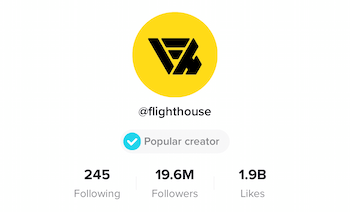
Live video streaming is available on TikTok, but only once you’ve reached 1,000 followers. While that seems like a low follower count compared to other social media platforms, it’s very difficult to achieve on TikTok without an intentional strategy for gaining and keeping an audience’s attention. It’s easy to get people to watch your videos, but not to get them to subscribe and follow you.
When you go live on TikTok, your video will be shown to all of your followers in their feeds. The alert that you’ve gone live is clearly displayed at the top of their feed and on their notification bar. People can then share your live stream with all of their followers, resulting in the potential for exponential growth on TikTok. Once your live video is done, it disappears completely and is gone forever.
Once the ability to record live video is unlocked on your TikTok account, you’ll find it’s similar to YouTube’s live-streaming product. People can purchase virtual gifts within TikTok using one of several in-app currencies. The most common one is coins, which are obtained in different bundles with actual money.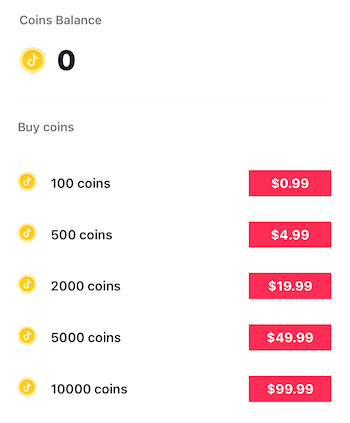
The virtual gifts, which are essentially emoji stickers with funny names like Concert, Cowboy, and Drama Queen, can be used to reward creators for having great content. The gifts come in a range of values and sizes between $0.50 and $50 and can be converted back into real money, of which the creators keep some portion of.
If your live stream attracts hundreds or thousands of people, you have the potential to earn hundreds or even thousands of dollars if each of them contributes as you broadcast.
TikTok has a phenomenal hashtag system, but hashtags are limited by the short 140 characters allowed for each video caption. This caption must include not only the entire video description but also needs to have all of the hashtags that you want to rank for.
Rachel adopted a practice of adding a combination of niched-down hashtags, as well as very general ones to her TikTok videos. The hope is that your video will be found in the smaller hashtags and then will continue to rank as you move up into the bigger hashtags. The more users engage with your video, the further up it will rank within the different hashtags.
Captions on TikTok appear on top of the videos as they play and remain for the duration of the video like they do on Instagram Stories. According to Rachel, captions can be placed anywhere on the screen and are graphic-based text rather than true text.
Our newest show, AI Explored, might be just what you’re looking for. It’s for marketers, creators, and entrepreneurs who want to understand how to use AI in their business.
It’s hosted by Michael Stelzner and explores this exciting new frontier in easy-to-understand terms.
Pull up your favorite podcast app and search for AI Explored. Or click the button below for more information.
Although the platform currently doesn’t support clickable links within the videos or a swipe-up option, users can include a link in their TikTok bios. Rachel noticed a recognizable jump in her website traffic when another user visited her profile and read the URL in her bio during a live broadcast on TikTok. It wasn’t a significant jump, but it was enough to make other people go and search for her website.
Like video captions, the bios on TikTok are also limited to 140 characters of plain text and emojis. The 140 characters can include a link to your website; however, the URL isn’t clickable. You can upload one profile photo and your previous ones aren’t saved in an album as they are on Facebook.
Rachel admits that analytics in TikTok are lacking. Creators can currently only see how many people have watched their videos and how many have reacted to them. You can also see who has viewed your profile. That’s about it.
TikTok doesn’t provide demographic data on your followers or users who’ve engaged with your content on the platform.
When it comes to TikTok, videos that are overproduced, too corporate, or overtly promotional tend to spark outrage. Rachel has witnessed people go crazy in the comments when they sense a regular user is trying to sell them something or sneak in an ad.
Rachel suggests taking the time to research what the content on TikTok feels like and create videos that naturally blend within this environment. Watch other people’s content and start to identify and adopt the trends you see.
As more people are becoming “TikTok-famous,” the platform is beginning to explore how to natively integrate advertising. TikTok recently began experimenting with a new self-serve ad platform as major brands clamor to reach the younger demographic on the platform.
I mention that Macy’s recently used TikTok to run a back-to-school campaign targeting high school and college kids. Rachel recalls alcohol brands, concerts, big parties, and musicians being promoted on TikTok too.
Once TikTok’s ad program is fully rolled out, marketers will be able to diversify their clients and offer something beyond Facebook, Instagram, Twitter, and all of the other trusted platforms we’ve relied upon until this point. You’ll begin seeing more ads throughout the feed and notifications in the future.
When you open the TikTok app to create content, there are several different options for getting started. Similar to Instagram Stories, you can hold down the button for the entire duration of the video to natively record. You can set up a self-timer and record from a distance. You can also create a series of short segments that come together to form a longer video.
TikTok encourages users to create native content within the app but allows pre-edited videos to be uploaded too. Users can then add awesome effects and text throughout different parts of their videos to make them interesting and fun. TikTok videos can also be downloaded and repurposed for other platforms like Facebook or Instagram.
Videos on TikTok are a combination of lip-syncing to original and uploaded music, sound effects and audio clips, rants, and anything else the imagination can create.
TikTok’s roots are in music content but Rachel observed that users are moving away from singing along to music and going more towards creating their own snarky renditions of songs. The user will sing new lyrics to a song and create a video with a funny take, creative interpretation, or double meaning of the words.
Start by observing funny things that happen throughout your life and look for inspiration everywhere. Rachel’s standbys for inspiration are Reddit and Twitter. If she goes there and discovers that other people like her or people in her target audience are intensifying or reacting to a certain thing, she’ll make a funny video about it.
For example, Rachel identifies as a working mom. She sees that other women online in her age group are sharing their frustrations with being a working mom too. So she thinks that it might be funny to create a video where she wears a blazer on top and pajamas on the bottom and calls it the “conference call look” as a way to reach this audience.
If Rachel is in an airport, she looks for airport hashtags on TikTok and other platforms. She takes note of the different things others have done and that she can adopt for her TikTok videos. She looks for things she can do in her particular location or while she waits.
Rachel notices that many videos have a plot twist midway, at approximately 7 to 10 seconds. Things will appear to be going a certain way in the beginning and then take a totally different direction that shocks everyone.
The initial shock makes people want to see it again with a fresh perspective. They get hooked into watching it over and over. Then they come back to leave comments or tag their friends to share it with them. This is the goal.
In one of Rachel’s videos, she puts uncooked macaroni noodles between her teeth and asks her eight-year-old daughter to walk on her back. As her daughter walks on her back, Rachel crunched the noodles in her mouth. Not realizing it was just a prank nor that Rachel was recording a video, her daughter started crying instantly.
Rachel thought it was so funny that she couldn’t stop laughing. With 10,000 views in just 48 hours, her audience apparently loved it too.
When you create and upload a video using your own voice or sound effects on TikTok, you get attribution for that sound forever. This means that any video that reuses your audio clips will ultimately be directed back to your account. Uploading your own sounds is another way to grow and lend some positivity toward your brand on TikTok.
To illustrate, Arnold Schwarzenegger uploaded some incredibly interesting native audio clips to TikTok and instantly went viral with everyone looking to reshare just one of his videos. TikTok users are so excited about creating their own videos around Arnold Schwarzenegger’s audio clips that Rachel can’t look through her TikTok feed without seeing someone using his native sounds.
In fact, people were so enthusiastic about it that when the next video in his feed is an ad for his protein shake, which he also uses the platform to promote, people had an overwhelmingly positive reaction to it.
Rachel shares that she plans to use TikTok for exposure and growth over the next year. She’ll do this by nurturing a younger following on the platform and preparing this audience to know who she is in the next 10 or 20 years.
Most people haven’t realized that TikTok video offers the ability to pitch or create trainings. Most creators hop on and just create videos about their regular life—putting on makeup, practicing an instrument, or playing a video game as people do on Twitch.
Rachel plans to launch live videos that train people how to become social media managers and strategists. Her strategy is to use these live trainings to drive traffic to her lead magnets and grow her email list.
TLDR This is a browser extension that automatically summarizes any articles, web pages, or other big blocks of text into five succinct bullet points. TLDR typically stands for “too long, didn’t read” on the Internet and the tool solves this problem.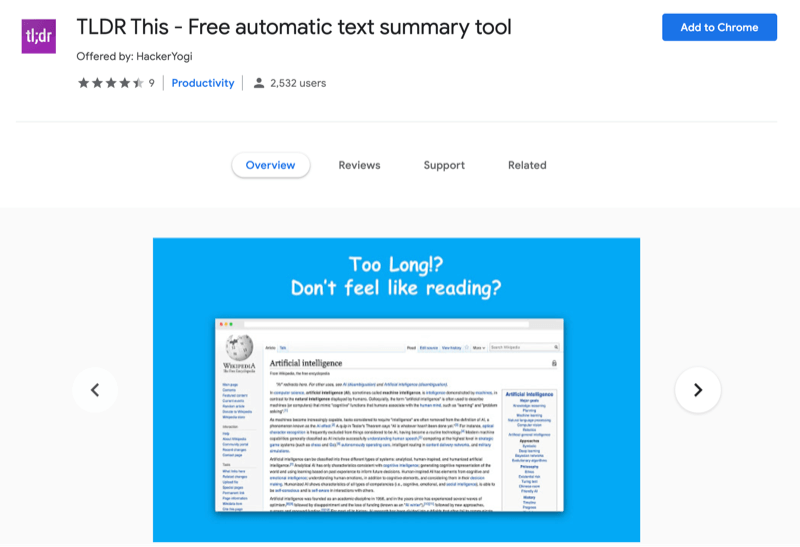
You drop a URL for a web-based article, or copy and paste the text into TLDR This. It skims the article and highlights the important points in a format that can be read in mere seconds. The summaries are written in full sentences that are grammatically correct, accurate, and straightforward.
TLDR This is available online as a web page and as a Chrome or Firefox browser extension.
Listen to the show to hear more about TLDR.
Help Us Spread the Word! Please let your Twitter followers know about this podcast. Simply click here now to post a tweet.
If you enjoyed this episode of the Social Media Marketing podcast, please head over to iTunes, leave a rating, write a review, and subscribe. And if you listen on Stitcher, please click here to rate and review this show.
What do you think? What are your thoughts on creating content for your brand on TikTok? Please share your comments below.
Want to go even deeper with your marketing? Check out the Social Media Marketing Podcast! Publishing weekly since 2012, the Social Media Marketing Podcast helps you navigate the constantly changing marketing jungle, with expert interviews from marketing pros.
But don’t let the name fool you. This show is about a lot more than just social media marketing. With over 600 episodes and millions of downloads each year, this show has been a trusted source for marketers for well over a decade.
Get our latest articles delivered to your email inbox and get the FREE Social Media Marketing Industry Report (43 pages, 60+ charts)!
Need a new plan? Discover how marketers plan to change their social activities in the 16th annual Social Media Marketing Industry Report. It reveals what marketers have planned for their social activities, content marketing, and more! Get this free report now and never miss another great article from us. Join more than 385,000 marketers!
Simply click the button below to get the free report:
Google’s Mueller Answers How to SEO a Podcast Site – Search Engine Journal
Join us in analyzing 3 case studies that show the importance of driving brand search behavior and engagement, and how to do it in months, instead of years.
Maximize your SEO efforts in 2024 with insights on Google’s SGE, algorithm updates, and expert tips to keep your site ahead.
Download this guide and learn how to optimize and manage Google Performance Max campaigns, with expert insights and actionable strategies to ensure your campaigns are effective.
Join us in analyzing 3 case studies that show the importance of driving brand search behavior and engagement, and how to do it in months, instead of years.
Join us in analyzing 3 case studies that show the importance of driving brand search behavior and engagement, and how to do it in months, instead of years.
Join us as we dive into exclusive survey data from industry-leading SEOs, digital marketers, content marketers, and more to highlight the top priorities and challenges that will shape the future of search in 2025.
In a Reddit discussion someone asked how to optimize an audio based site that featured podcasts and audiobooks. John Mueller and others in the Reddit community provided useful advice.
This is the original question:
“Our website is a PWA and it hosts audiobooks, podcasts, and audio shows how to tell google that treats us from that point of view because it may penalize us fr not having content on-page.”
PWA means Progressive Web App. It’s a website that behaves like an app.
The person asking the question noted that they had meta description, title and thirty to fifty words of descriptive content.
John Mueller reaffirmed that all pages need content in order for Google to understand what the page is about and subsequently rank it. John offers good advice and it’s printed below. However, the other users on Reddit provided excellent follow up.
First, here’s Mueller’s response:
“You always need textual content on-page, regardless of what other kinds of content you might have.
If you’re a video-hosting site, you still need things like titles, headings, text, links, etc. The same goes for audio-hosting sites. Make it easy for search engines to understand your content & how it’s relevant to users, and they’ll be able to send you relevant traffic.”
The part about “how it’s relevant to users” is interesting. Ordinarily many people tend to think in terms of describing what something is about. But a good way to solve the content writing problem is to first think about how the content is used by the site visitor and what they are trying to accomplish.
Mueller added:
“If you make it hard for search engines to figure out what your pages are about, it would be normal for them to struggle to figure out how your site is relevant for users.”
Mueller repeated his encouragement to describe how the content is relevant to users. It’s a good approach in terms of mapping out a content strategy.
Affiliate SEO Content Ranking Formula
It’s a content strategy that I’ve used for well over fifteen years for affiliate sites and I suspect many others use variations of it as well.
This is the essence of the content strategy: The content describes the product and what it can help the user accomplish. That’s it, that’s the formula.
The Reddit members offered several alternative SEO tips for podcasting sites, such as transcribing the content and structured data.
One member suggested transcribing the content so that Google could index what was said in textual form. That may be useful for certain kinds of content, particularly instructional content.
But I think one must consider that what was spoken might not always rank for what you want it to rank.
For example, some podcasts are people relating their personal history while some podcasts are about crime mysteries. Will transcribing the true crime podcast help that podcast rank for the phrase, True Crime Podcast?
It’s possible the page might end up ranking for random phrases. After all, the podcast itself is a story and not a description of what it is.
Another useful suggestion was structured data. That’s a good way to communicate data. This is great advice.
As with any implementation of structured data, be sure that whatever information you put into your structured data that the same information is available on the web page itself.
The information for podcast structured data can be found at Schema.org. It’s worth reading all the details you can provide. For example, you can add Review structured data if the podcast is a review of a brand, product, or place.
Additionally, Google requires an RSS feed in order to use it for Google Podcasts, Google Play Music, Google Search and more. Full information here.
There is also more information about Google Actions for Google Assistant here and at Google’s podcast developer page.
Google treats audiobooks a little differently in that there are Book Actions. For Book Actions they appear to give preference to retailers who publish a large selection.
From Google’s page on structured data for books:
“To ensure robust coverage and better serve our users, this feature is currently limited to book providers that have broad book availability.”
There is a link on that page where you can register to be eligible to show book actions.
However, the page has a section for rich results. It’s unclear if one has to register to have those rich results show up though. Rich results is different from Google Actions, right?
“You must include the required properties for your content to be eligible for display as a rich result. You can also include the recommended properties to add more information about your content, which could provide a better user experience.”
There are a number of required properties and recommended properties. The recommended properties are fine to not include if they’re not appropriate for your situation. View the full list on Google’s book structured data page. Find examples of audiobook structured data on the official Schema.org page for structured data here.
The answer to how to SEO an audiobook or a podcast contains many answers depending on your scenario. Mueller’s advice to create content that describes how and why the podcast or audiobook is relevant to the user is a great start. After that there are more solutions depending on audio that is being promoted.
Read the Reddit discussion here.
Related: How to Make Your Podcast SEO-Friendly
I have 25 years hands-on experience in SEO, evolving along with the search engines by keeping up with the latest …
Conquer your day with daily search marketing news.
Join Our Newsletter.
Get your daily dose of search know-how.
In a world ruled by algorithms, SEJ brings timely, relevant information for SEOs, marketers, and entrepreneurs to optimize and grow their businesses — and careers.
Copyright © 2024 Search Engine Journal. All rights reserved. Published by Alpha Brand Media.
